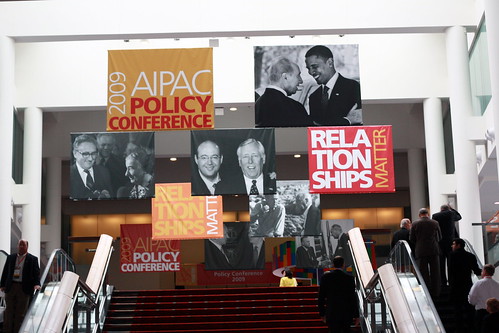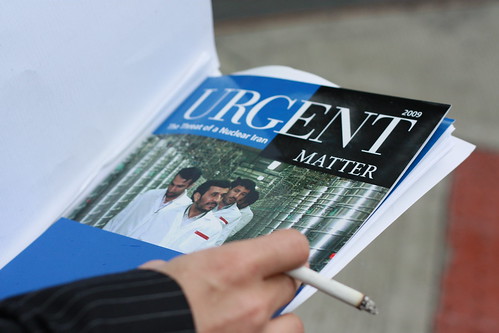The theme of this year's AIPAC Policy Conference, which concluded today, was "Relationships Matter." Of course, the U.S.-Israel relationship has taken on new contours in the past several months. A new Israeli government -- one dominated by conservatives wary of dismantling Jewish settlements and hesitant to move toward Palestinian statehood -- has been met by a Democratic administration with a stated goal of reconfiguring U.S. foreign policy to focus more on diplomacy and human rights. Indeed, at the convention this morning, both Joe Biden and John Kerry told AIPAC that if the Israeli government wants the support of ruling Democrats, it must move quickly to make a Palestinian state a reality. (AIPAC itself already favors a two-state solution, but not necessarily moving there with the speed progressives would like.)
Simultaneously, concern about Iran's acquisition of nuclear technology has led to increasingly fevered talk of a possible military attack targeting Iran's capabilities, although the details of Iran's nuclear program remain unknown. Iranian President Mahmoud Ahmadinejad, who is facing re-election on June 12, continues to deny the Holocaust, adding to Israel's bellicosity. And in the U.S. Congress, AIPAC is pushing a bill, introduced by 27 senators, that would sanction Iran by prohibiting companies that do business with Iran's petroleum sector from also doing business within the United States.
At the conference yesterday, I attended a panel discussion on the Iranian election. The takeaway, delivered by liberal hawk Kenneth Pollack and conservative hawk Ilan Berman, was that the United States and Israel cannot afford to hold-off on aggressive economic sanctions while waiting to see if Iran elects a more moderate president with whom the international community can credibly negotiate. Iran's president, both men said, is largely irrelevant, since it is Ayatollah Khamenei, Iran's Supreme Leader, who is charting the nation's foreign policy course.
Despite this message of Ahmadinejad's relative impotence, the Iranian president was a real star of the conference. As a Holocaust-denier, his likeness is unquestionably a powerful one for AIPAC to employ. Press packets included a fold-out poster entitled "URGENT MATTER: The Threat of a Nuclear Iran," pictured below.
In the break-out session on Iran, one AIPAC delegate asked whether sanctioning Iran would, politically, lessen the U.S. Congress' openness to attacking the nation militarily. That comment serves as a reminder that some folks simply won't be satisfied with diplomacy.
Of course, the back drop to the confrontation with Iran is a marked shift in tone in the American debate about the Israeli-Palestinian conflict. J Street, the "pro-Israel, pro-peace" PAC, has arrived on the scene with a savvy media strategy, and is launching a program on college campuses. And many Americans were perplexed by the overwhelming force used by Israel during its incursion into Gaza earlier this year, in which some 1,000 Palestinians were killed. Indeed, I don't think we should underestimate American war-weariness right now, as we enter into the sixth year of the Iraq and Afghanistan conflicts. If any factor guarantees American moderation on these matters, it is the synergy between the Obama administration's commitment to regional diplomacy and the American public's aversion to more war.
--Dana Goldstein





